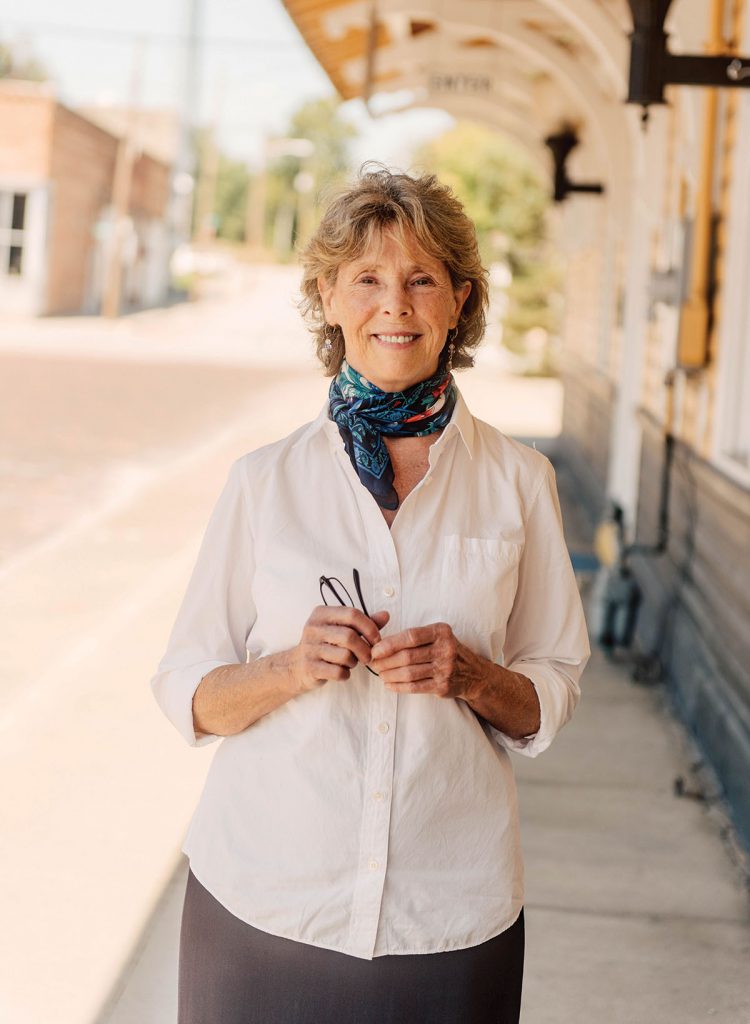
GIVE TREES A CHANCE: ECO members entertained attendees at the 1990 Earth Day celebrations at Blue Ridge Community College in Hendersonville. ECO has hosted Earth Day events in Henderson County ever since.
There was a time in Henderson County’s not-too-distant past when preserving the city’s urban forest was considered bad for business. “It seems almost funny now that that was an issue, but it was,” says Mary Jo Padgett of those days 25 years ago, when she and her then-husband David Malpass had just set up what they called the Outing and Environmental Group. “We realized we wanted a project that used our common interests in politics and the environment, and we knew other people were interested in these issues, too. So we agreed to call a meeting to talk about these things and see who comes.”
Thirty-five people came that September evening in 1987. Three years later, there were enough volunteers and enthusiasm to build the Jackson Park Nature Trail, and a more structured approach to a broader range of activities seemed advisable. By 1992, non-profit status had been approved for the group rechristened under the name Environmental and Conservation Organization
This month, as ECO celebrates a quarter-century of environmental activism and more than a hundred members, the organization’s mission has expanded far beyond the nuts-and-bolts issues of those formative days — a proposed incinerator in Fletcher, an asphalt plant proposed for a recognized wetland — to broader and more fundamental initiatives like water quality, recycling, and building a “green infrastructure” by encouraging government and business to adopt environmentally responsible practices. Other efforts have included the creation of Backyard Wildlife Habitats throughout the county and helping to create DuPont State Forest, North Carolina’s most popular state forest. “Mary Jo has an extraordinary environmental awareness,” says ECO’s interim executive director Katherine Freeman. “She never, never gives up.”
Among the first of ECO’s outreach efforts was the creation in the early 1990’s of a countywide water quality monitoring system, now in place at nearly 60 sites. Over 30 of those sites are part of ECO’s Volunteer Water Information Network (VWIN), which was joined 10 years ago with a bio-monitoring program that tracks the health of invertebrate species in local waterways as an indicator of water quality; and three years ago by an Adopt-A-Stream program that partners with local community and civic groups, businesses and schools for regular visual inspections of the county’s most well-known waterways. “It’s been a very effective form of what I call ‘backyard stewardship,'” says Rachel Hodge, ECO’s current water quality administrator. “It allows citizens to take ownership in protecting the creeks and streams they know and see every day.”

Mary Jo Padgett, Michael Arrowood and Michele Skeele (c. 1995). Arrowood and Skeele received the Governor’s Award for Outstanding Volunteer Service from NC Governor Hunt. Arrowood for work on the trails in the Green River Gamelands; Skeele for assisting with ECO’s Volunteer Water Information Network program.
The effort has paid off in the consistent ‘good-to-excellent’ quality ratings of samples taken from the Green River watershed. The restoration of the Mud Creek watershed, an ongoing ECO-sponsored project, has already produced noticeable reductions in the waterway’s sediment and improvements in water clarity. “Spreading the word about simple ways citizens can take action on their own property helps lessen the addition of sediment, pollutants and erosion in our streams,” Rachel says. “So we’re always looking to increase our volunteer base and our outreach programs, especially to younger generations.”
Other early efforts by ECO volunteers have produced results more immediately useful to the county’s population on a daily basis, like greenways, bicycle lanes and sidewalks. “Back then, the transportation committee for the county was essentially a group of businessmen,” Mary Jo recalls of ECO’s early days, “which generally proposed more roads and bypasses. We suggested that a committee should be formed with ‘regular’ people on it, like pedestrians, cyclists and those who would like to use public transportation. We believe in participating in government, not fighting it.”
The partnership approach has involved working with, among others, the state Division of Air Quality to regulate open burning and a with number of city and county planning agencies to encourage the adoption of environmental standards for new development and infrastructure. One example, Mary Jo says, and one hardly noticed in these days of greater public awareness of such standards, is the parking lot beside the county library, dotted with trees instead of the usual vast expanse of trash-strewn asphalt.
A more recent addition to ECO’s activities is its Green Infrastructure initiative, intended to foster public policies and private-sector practices that protect open space, watersheds and sensitive habitats. Efforts are underway, for example, to persuade the county to adopt an Open Space plan that will protect farmland and forested areas by requiring new development to dedicate specified amounts of land to open space. Storm water runoff that used to be absorbed by farmland and forest cover is now pooling on paved surfaces and collecting contaminants like automobile oil, fertilizers and trash before being siphoned off by gutters and drains into rivers and streams, so ECO is advocating a storm water management plan for new development, too. And ECO board members have individually undertaken projects that help preserve Henderson County’s rural heritage, like the Heritage Apple Tree Sale developed by board member Bruce Lowe in 1996, and the Clean Air Car Fair that was an annual event for six years at the Southeast Environmental Expo, coordinated by board member Tom Davis.
As ECO enters its second quarter-century, the vision of its founding couple remains intact, even though Mary Jo retired as executive director in 2007 to assume an advisory role. (She and David Malpass, who now lives in Savannah, divorced in 1993.) “I’m proud that it’s an organization with a strong foundation and a balanced philosophy,” Mary Jo says, “that continues to thrive without me!”
Learn more about ECO
ECO sponsors numerous events and is always seeking volunteers. Some upcoming events include:
Big Sweep Community Stream Clean Up Day: Individuals and teams clean streams across WNC.
4th Annual Environmental Film Festival: Films, speakers and discussions at the Hendersonville Little Theater.
Winter Solstice Night Hike: A nighttime stroll through Hooker Falls in DuPont State Forest.
Visit www.eco-wnc.org or call
828-692-0385 to learn more.



